|
It's important to have a Music Performance Agreement between you and the venue so the terms are clear and there's no gray area to figure out during or after the gig. Send this form ahead of time to the booking agent, talent buyer or music coordinator at the venue if they don't send you one first.
On the form you will of course include all of your Contact Information. If your act has multiple members then this is a good way to have one member be the point person. It is very important to have a phone number that the talent buyer can use to reach you easily for updates to the gig or contact when you are on the road. The performance Date is helpful to keep clear for scheduling, travel and information for publicity and obviously showing up on the right date for your gig and making sure the venue doesn't double book you. Pinpoint the location / address of the venue to plug into your maps app. so you can arrive in a timely manner and plan your travel time. If your venue is in your home town and you play there a lot then maybe mapping it out isn't important but this contract is still important. If the Event has a name, like if it is part of a certain music festival, a series, showcase or something along those lines, it is helpful for publicity to indicate that. All of these items ensure that you and the venue are on the same page. The Services section covers a lot of useful information to the venue so they are clear about what to expect: what services you are providing / your genre, band members, or any notes about what you are delivering, so that the venue isn't expecting a full band when you show up solo. The Performance Details are often filled by the venue and can include: the performance order and where you're placed on the bill, how long your sets are, breaks, if there's more than one act performing, what time you're expected to arrive and load in and do sound check. You can ask about these details in this section if they haven't been previously arranged. It's good to have the venue write down PA / Equipment Details so you know what you need to bring and what the venue has. You can also put your tech. / stage plot requirements here. Payment: this is good to clarify your compensation, wether it's a guarantee, percentage of the door cover or ticket sales. Does it include food & drink? Are you getting paid a portion of the money upfront (“deposit”), and if so, what is that amount, and when is it due to be received? Are you being paid before or after the show? How are you getting paid – cash or check? There are a lot of variables in how artists are compensated so it is good to get those details taken care of before the gig. Seems like I may have forgotten something, right? Other Info. to include could be an agreement as to what happens if you are sick or the event gets rained out or anything else that is unique to the performance. After you and the talent buyer sign and date it, and you get their contact info. so you can text them when you get to the venue, you'll have taken care of business and you'll be able to focus on the performance. Download the complimentary form below! Have fun! chime in : Do you you already have a form you use? How does it differ from mine? Have you noticed using a Performance Agreement helps ? How often do you use them? kindly, Mike Caruso ( MAGNETIC WEST MUSIC )
0 Comments
I met with my friend, singer/songwriter Justin Gordon and we talked about his new album Backwater. Early on in the conversation he stated :
“you compartmentalize some part of your identity and, for me, I’ve always been committed to making records. It’s how I’ve arbitrarily chosen to mark the eras of my life. ” With what Justin communicates in his music, he believes the listeners to be " the presumed perpetrator of bad culture, which is in fact, the person who is just like you or me or anybody else, doing their best. ” In addition, he describes the album as "a query to be answered by O yea, I understand what you are saying... I feel that way all the time. It’s a call for reassurance. " He continues to illustrate this reciprocity one might have with his music as “I heard that song and I really connected with it because I feel the similar feeling of alienation or something along those lines " and then he " connects with that person over that feeling.” Furthermore, of the material that floats in the mirror pool of Backwater, he says " some of them are just love songs or songs of lost youth. ”
We examined the element of songwriting where you decide to include or leave out specific place names and Justin said " certain songwriters use that to great effect. You think it might be putting people on the outside - well I’m not from Jersey - or something like that but it’s almost an intimacy , it can be like you are getting let in on this person’s geography, like an inner circle." The album's songs feel rooted in the geography of southern backwater reflecting a warm desert glow, but the songwriter sites locations spanning from Maine to Southern Oregon, from Athens, Ohio and the Lost Coast of California, and as far as Mexico and Columbia.
From the first tones of the acoustic guitar on the opening track, Folly of Youth, you can hear the carefree character of Justin’s $10. guitar that has appeared in many recordings (including the 2006 album entitled Ten Dollar Guitar ) . On this track, that has some of his signature chord structuring, comfortable vocals deliver a confident melody and the final moments of the song are enchanted with the chiming notes of piano. On the track that follows it, Cabin Life, the buttery growl of Justin’s Harmony Rocket , a semi-hollow body guitar with gold foil pickups, churns under his poetics. Then Possibilities shows up to celebrate with a fun retro style. Riohacha, which appeared on 2016 album Home Fires as a reverb soaked acoustic track ( which I coincidentally played on accordion on) got released in it’s full glory brewed in the smokey Backwater which is the original version of the song , how it is played live, with Dave Hampton on drums and Jeff Fretwell on bass.
The album , like Justin’s other work , is full of captivating melodies to hum , or whistle, like he does in Wilderness, which, if you’ve heard his song Me & Chuckles, you might recognize the melody (Wilderness was actually partially written while in Guatemala in 2009. Me & Chuckles came later and took over some of that melody . ) Simple Man is a tune that I could hear spinning in the background of a party, cascading good vibes into the air. The playful marimba sound comes from an 80’s Casio keyboard which he feels is a portrayal of a “simple melody played in someone’s bedroom , a lack of polish, a counterpoint of clean tone” to balance out the warm lo-fi recording. “I like combining those things” he adds. Stones , the fifth track on the album is a beautiful deep dive into emotional territory. Elders, which delivers an elegant sense of the sonic field of the album and The Beach , which brings you right there to that sandy location with an easy going rhythm and relatable lyrics, are two personal favorites for the songwriter. When I asked Justin to elaborate on Elders, which is my favorite too, he said “ I was looking at chords that I had written out years ago with the first verse of the song, there was a scribbled out chord and the scribbled out chord looked like a letter C. I played the progression and I was like, That’s not right, but I like it. It was a strange place to start a verse or a song but I was like oh, this is going someplace already.” He continued with “most songwriters are either embracing their structure or trying to find new ways to get out of their tendencies or chord progressions. I don’t make any great effort to get out of my chord progression tendencies but I certainly try to think of every possible angle that I can go on a key...there are no rules”.
The warm, inviting recording , which was originally supposed to be captured directly to 1/4” 4 track reel to reel tape, was actually recorded digitally and then mastered to tape. The melodies are engaging and the well crafted lyrics rise throughout the album like delicate desert flowers or gasoline fumes packing a pungent punch. It is truly gritty and honest Americana poetry at its finest. Backwater reaches new landscapes in its effort to remove itself from the mainstream but it is certainly not a departure from Justin's well seasoned creative persona. The achievement catches my senses. It is firmly rooted in honesty and it feels good to listen to. About the title's theme Justin says " Backwater is a place where things don’t change, they haven’t been modernized. I wanted to convey reclusion or trying to achieve some remoteness, a getting away, an escape from feeling crowded, which coalesced on a trip to the Lost Coast. I think this collection of songs is like the Lost Coast. It's about appreciating the old ways. "
|
AuthorMike Caruso Archives
February 2024
|
|
© COPYRIGHT 2023 MAGNETIC WEST MUSIC |

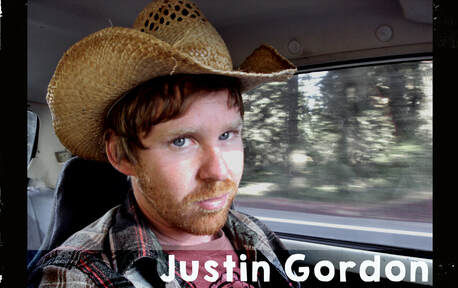
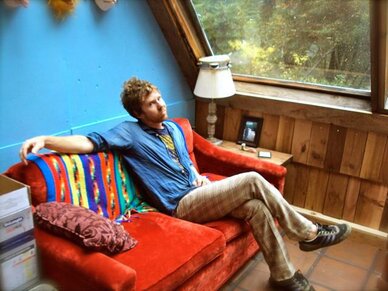
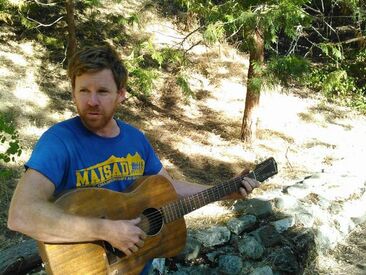
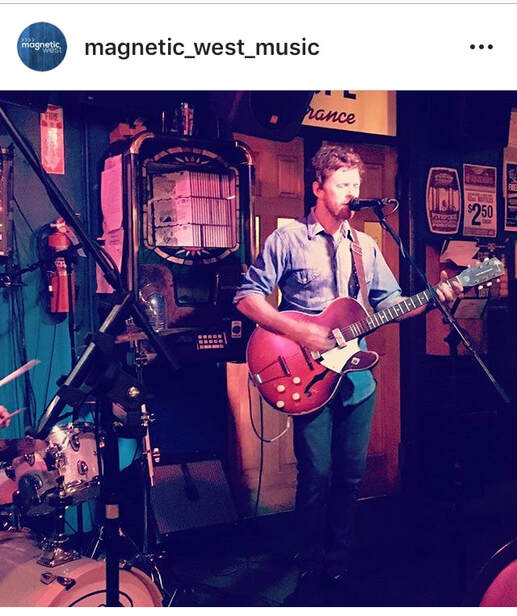
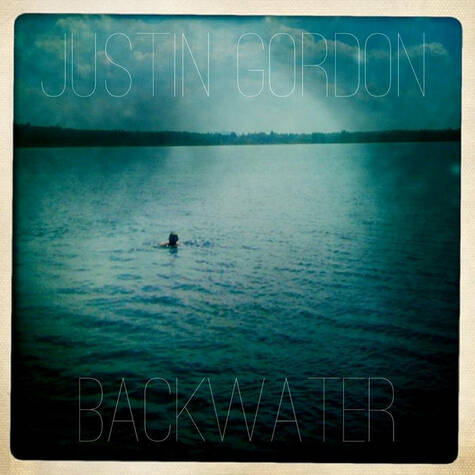
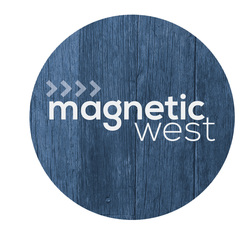
 RSS Feed
RSS Feed
